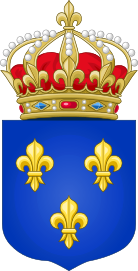List of ambassadors of France to the Kingdom of Great Britain facts for kids
French ambassadors are special representatives sent by France to other countries. Their job is to help France and the other country stay friends and work together. They talk about important things like trade, peace, and shared interests.
This list shows the people who were French ambassadors to the Kingdom of Great Britain a long time ago. Great Britain was the country that included England, Scotland, and Wales at that time. These ambassadors helped manage the relationship between France and Great Britain, even during times of war.
Contents
During the Wars of Spanish Succession (1701–1712)
This was a big war in Europe. Different countries fought over who should be the next king of Spain. France and Great Britain were on opposite sides for much of this time.
- 1697–1701: Camille d'Hostun de La Baume, Duke of Tallard
- 1701–1715: Jean-Baptiste Colbert, Marquis of Torcy (He was France's top diplomat for foreign affairs.)
- 1701–1702: Chevalier Jean-Baptiste de Poussin (A temporary helper.)
- 1702–1705: Louis de Rouvroy, Duke of Saint-Simon (A diplomat in charge when the main ambassador was away.)
- 1703–1710: Abbé François Gaultier (Another temporary helper.)
- 1705–1707: Nathaniel, Baron Hooke (A military expert from the French Army.)
- 1708–1710: Charles-Auguste de Goÿon de Matignon, Count of Gacé (A diplomat in charge.)
- 1710: Count Luigi Ferdinando Marsigli (A temporary helper from France and Italy.)
- 1711: Chevalier Nicolas Mesnager (A temporary helper.)
- 1712: Louis d'Aumont (A high-ranking diplomat.)
- 1712–1713: Nicolas du Blé, Marquis d'Huxelles (A high-ranking diplomat.)
- 1713: Nicolas Mesnager, later Count of Saint-Jean (A temporary helper.)
- 1713–1716: Charles-François d'Iberville, Marquis de La Bonde
- 1716–1718: Abbé Guillaume Dubois (He later became a Cardinal in the Catholic Church.)
- 1716–1722: Philippe Néricault Destouches, later Count of Langeron (A temporary helper.)
- 1718: Yves d'Alègre, Marquis de Tourzel
- 1718–1720: Henri, Marquis de Saint-Nectaire
- 1722–1724: Théodore Chevignard de Chavigny, Count of Toulongeon
- 1724–1727: François-Marie, Count later Duke de Broglie
- 1727–1731: Joachim Trotti, Marquis de La Chétardie
- 1731: Théodore Chevignard de Chavigny, Count of Toulongeon
- 1731–1732: Abbé Jacques Deschamps (A temporary helper.)
- 1733–1735: Philippe de Montboissier de Beaufort, Marquis de Canillac
- 1735–1736: Bishop Roger de Bussy-Rabutin (A high-ranking diplomat.)
- 1737–1739: Gaston-Pierre-Charles de Lévis, Viscount later Duke de Mirepoix
- 1740–1741: Chevalier Étienne de Silhouette (A temporary helper.)
- 1741–1742: Gabriel-Jacques de Salignac, Viscount later Marquis de Fénelon (A special ambassador.)
During the Wars of Austrian Succession (1741–1748)
This was another major European conflict. Countries fought over who should rule Austria. France and Great Britain were again on opposing sides.
- 1746–1747: Jerónimo, Duke de Grimaldi
- 1747: General Ricardo Wall y Devereux (A military expert.)
- 1747–1748: Bishop Guy de Guérapin de Vauréal (A temporary helper.)
- 1748–1749: Louis de Cardevac, Marquis d'Havrincourt (A high-ranking diplomat.)
- 1749–1754: Gaston-Pierre-Charles de Lévis, Duke de Mirepoix (A special ambassador.)
- 1751–1752: Antoine-François, Marquis de Lambertye (A diplomat in charge.)
- 1752–1753: Charles Gravier, Count de Vergennes (A high-ranking diplomat.)
- 1754: François Beauharnais de Beaumont, Marquis de La Ferté (A military expert.)
- 1754–1755: Charles-François de Broglie, Marquis de Ruffec (A special ambassador.)
- 1756–1757: Chevalier Charles d'Éon (A temporary helper.)
- 1758–1761: Chevalier Jacques-Abraham Durand d'Aubigny (A high-ranking diplomat.)
During the Seven Years' War (1756–1762)
This was a global conflict, sometimes called the first "world war." It involved many major powers, including France and Great Britain, fighting over colonies and power.
- 1762–1763: Louis-Jules Barbon Mancini-Mazzarini, Duke de Nevers
- 1763–1767: Claude-Louis-François Régnier, Count later Marquis de Blosset
- 1768–1770: Louis-Marie-Florent de Lomont d'Haraucourt, Duke du Châtelet
- 1770–1776: Jean-Étienne Say (A temporary helper.)
- 1770–1776: Adrien-Louis de Bonnières, Duke de Guînes
- 1776–1783: Emmanuel-Marie-Louis, Marquis de Noailles
During the American War of Independence (1778–1782)
In this war, the American colonies fought for their independence from Great Britain. France supported the Americans, which led to conflict with Great Britain.
- 1783–1784: Chevalier Joseph-Mathias Gérard de Rayneval (A high-ranking diplomat.)
- 1783: Elénor-François-Elie, Marquis de Moustier (A diplomat in charge.)
- 1784–1787: Jean-Balthazar, Count d'Adhémar (A high-ranking diplomat.)
- 1788–1791: Anne-César, Chevalier later Marquis de La Luzerne
During the French Revolutionary Wars (1792–1801)
These wars began after the French Revolution, when France became a republic. Many European countries, including Great Britain, fought against the new French government.
- 1791–1792: Jean-Marie de Bancalis de Maurel, Marquis d'Aragon
- 1792–1793: François-Bernard de Chauvelin, Marquis de Grosbois
- 1792–1793: Charles de Talleyrand-Périgord, Bishop emeritus later Prince de Talleyrand (A special diplomat.)
- 1793: Citizen Hugues Maret later Duke de Bassano (A special diplomat.)
- 1793–1794: Citizen François later Marquis de Barthélemy (A special diplomat.)
- 1794: Citizen Claude Monneron (A special diplomat.)
French Revolutionary Government Foreign Ministers
See also
- List of ambassadors of France to England
- List of ambassadors of France to the United Kingdom
 | Selma Burke |
 | Pauline Powell Burns |
 | Frederick J. Brown |
 | Robert Blackburn |


